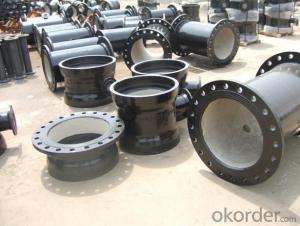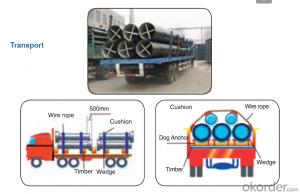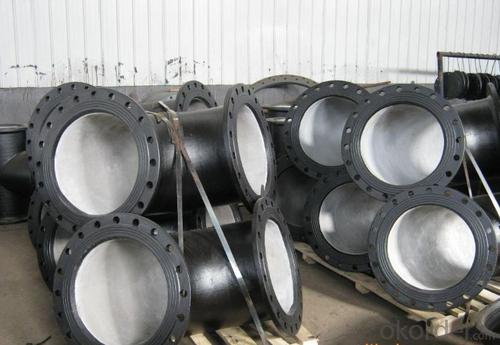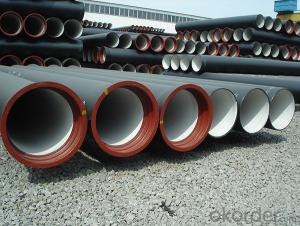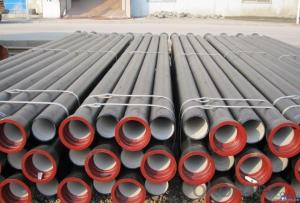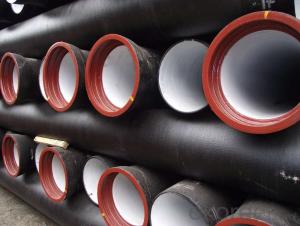Duct Iron Pipe DI Pipe ISO 2531 DN 80-2000mm Flanges
- Loading Port:
- Tianjin
- Payment Terms:
- TT OR LC
- Min Order Qty:
- 100 m
- Supply Capability:
- 100000 m/month
OKorder Service Pledge
OKorder Financial Service
You Might Also Like
Ductile iron pipe fittings:
Dimensions standard:
ISO2531: 50-1000mm, PN10/16
BS4772: 50-1000mm, PN10/16
EN545: 50-1000mm, PN10/16
Connecting mode:
Flanged
Socketed
Mechanical connection
Loose flanged
Coatings:
Inner lined with cement and outside coated with zinc plus bitumen
Inner and outside coated with epoxy resin
Inner and outside coated with fusion bonded epoxy resin
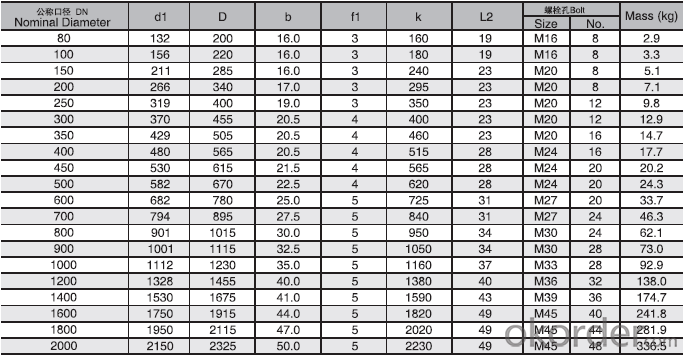
Quality:
ISO 2531 or EN 545 Standard K9 Class, K12 Class
1. ISO 9001 Certificate
2. ISO 2531 & EN 545 Certificate
3. WRAS Potable Water Certificate for FBE Internal Lining
4. WRAS EPDM Rubber Gasket or NBR Rubber Gasket
5. DN80mm - DN2000mm
6. Black Bitumen or Blue FBE / Epoxy Coating
7. Lengh = 6m or cut into 5.6m, 5.7m, 5.8m
8. Client's Brand Customization Allowable
9. Container or Bulk Loading / Shipping
10.Delivery within one Month or According to Client's Order Quantity
11. Support Client or The Third Party Inspection before Shipment
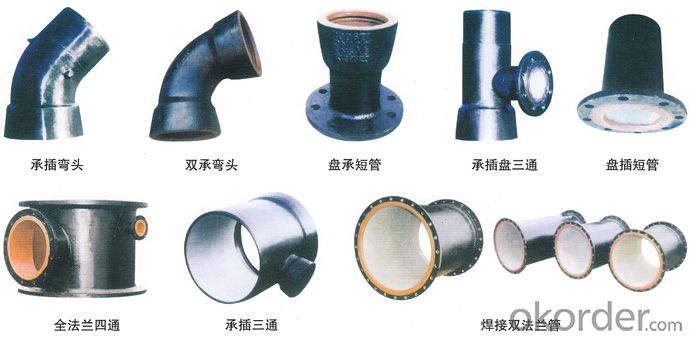
Transport:
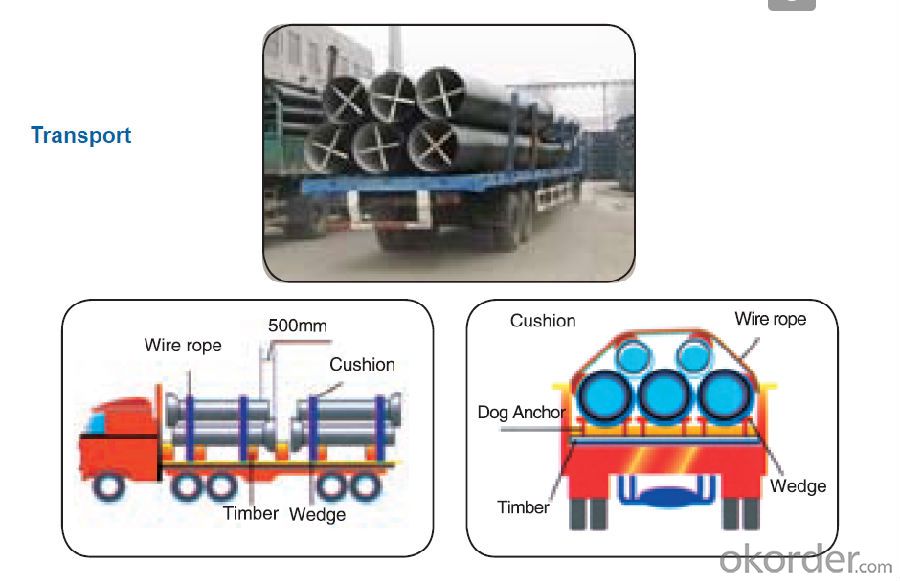
- Q: What is the maximum pressure rating for ductile iron pipe?
- The maximum pressure rating for ductile iron pipe typically ranges from 350 to 500 psi, depending on the diameter and wall thickness of the pipe. However, it is always recommended to consult the manufacturer's specifications for accurate and specific pressure ratings.
- Q: What is the expected burst pressure of ductile iron pipes?
- The expected burst pressure of ductile iron pipes can vary depending on various factors such as the pipe diameter, wall thickness, and the specific grade of ductile iron used. However, in general, ductile iron pipes typically have a burst pressure ranging from 350 to 700 psi (pounds per square inch).
- Q: Can ductile iron pipes be used in areas with high soil acidity?
- Yes, ductile iron pipes can be used in areas with high soil acidity. Ductile iron is highly resistant to corrosion, including the effects of soil acidity, making it a suitable choice for such environments.
- Q: What is the expected noise reduction of ductile iron pipes?
- The expected noise reduction of ductile iron pipes can vary depending on several factors, including the specific characteristics of the pipe material and design, the installation method, and the surrounding environment. However, generally speaking, ductile iron pipes have been found to provide significant noise reduction compared to other pipe materials. Ductile iron pipes are known for their superior acoustic performance due to their dense and robust construction. The material's high density helps to absorb and dampen noise vibrations, reducing the transmission of sound waves through the pipe. Additionally, the smooth internal surface of ductile iron pipes minimizes turbulence and friction, further contributing to noise reduction. Various studies and field tests have shown that ductile iron pipes can achieve noise reductions ranging from 10 to 20 decibels (dB) or even higher, depending on specific conditions. These noise reductions can significantly improve the acoustic environment in areas where the pipes are used, such as residential areas, hospitals, or schools. It is important to note that while ductile iron pipes can provide substantial noise reduction, other factors such as pipe connections, fittings, and valves can affect the overall acoustic performance. Proper installation techniques, including the use of effective seals and dampers, can further enhance noise reduction. In conclusion, ductile iron pipes are expected to deliver notable noise reduction benefits due to their dense construction, smooth internal surface, and efficient installation methods. However, it is essential to consider the specific project requirements and consult with professionals to determine the expected noise reduction levels based on the particular circumstances.
- Q: What are the typical installation methods for ductile iron pipe?
- The typical installation methods for ductile iron pipe include trenching, horizontal directional drilling, and jacking. In trenching, a trench is excavated and the pipe is laid and supported on a bed of aggregate. Horizontal directional drilling involves drilling a pilot hole underground and then pulling the pipe through the hole. Jacking is a method where the pipe is pushed into the ground using hydraulic jacks.
- Q: Method for joining cast iron pipes
- The connection between the pipe and the pipe adopts the form of socket type or flange disk interface. According to the function, it can be divided into two kinds: flexible interface and rigid interface. The flexible interface is sealed with rubber ring, which allows a certain degree of corner and displacement, so it has good seismic resistance and tightness. It is easy and quick to install than rigid interface. It has little labor intensity according to the casting method.
- Q: How does ductile iron pipe handle soil movement?
- Ductile iron pipe possesses exceptional strength and durability, making it highly effective in managing soil movement. When the surrounding soil shifts or settles, ductile iron pipes can flex and adapt to this movement without compromising their structural integrity. The ability of ductile iron pipes to handle soil movement stems from their inherent capacity to endure bending and stretching. They have a remarkable level of flexibility, allowing them to adjust to ground shifts and settle without experiencing any breakage or cracks. This flexibility arises from the distinctive material properties of ductile iron, a type of cast iron that has been treated with magnesium to enhance its strength and elasticity. Furthermore, ductile iron pipes are constructed with a thick wall, which enhances their resistance against soil movement. This robust construction assists in distributing the forces exerted by the shifting soil, minimizing the impact on the pipe and preventing significant damage. Moreover, ductile iron pipes are typically installed with suitable bedding and backfill materials to provide additional support and stability. This involves using compacted soil or engineered granular materials around the pipe, which helps evenly distribute the load and reduces the potential for soil movement. Overall, ductile iron pipe is an excellent choice for areas with high soil movement, such as regions with expansive or unstable soils. Its flexibility, strength, and proper installation techniques enable it to effectively handle the challenges presented by soil movement, ensuring long-lasting and dependable performance in various applications.
- Q: Ductile iron gears are generally treated without heat treatment
- Certainly. At the very least, the casting must be annealed and other heat treatment according to the requirement of use
- Q: How can the ductile iron pipe be tested?
- In the hydraulic test, the ductile iron pipe can not be close to the back, support, pipe end and so on. The inspection must be carried out after all stops
- Q: Do ductile iron pipes require special maintenance?
- Yes, ductile iron pipes do require special maintenance. While ductile iron is known for its strength and durability, it is still susceptible to certain forms of corrosion. Regular maintenance is necessary to prevent corrosion and prolong the lifespan of the pipes. This maintenance typically includes periodic inspections to check for any signs of corrosion or damage, as well as cleaning and protective coating applications. Additionally, proper handling and installation techniques should be followed to ensure the integrity of the pipes. Regular maintenance and adherence to industry best practices can help prevent leaks, breaks, and other issues, ultimately saving time and money in the long run.
Send your message to us
Duct Iron Pipe DI Pipe ISO 2531 DN 80-2000mm Flanges
- Loading Port:
- Tianjin
- Payment Terms:
- TT OR LC
- Min Order Qty:
- 100 m
- Supply Capability:
- 100000 m/month
OKorder Service Pledge
OKorder Financial Service
Similar products
Hot products
Hot Searches
Related keywords
